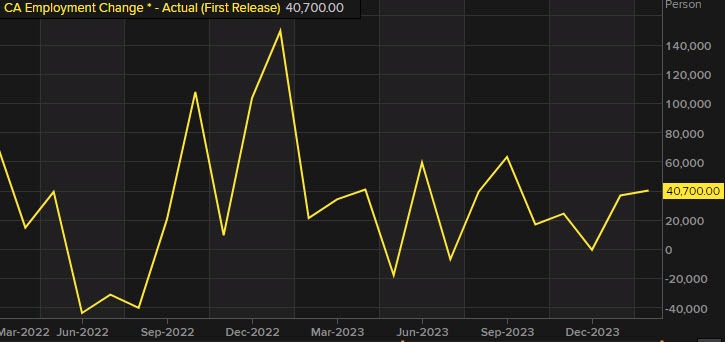
Canada employment change
- Prior month 37.3K
- Employment change 40.7K vs 20.0K estimate. Highest since September 2023.
- Unemployment rate 5.8% vs 5.8% estimate
- Prior unemployment rate 5.7%.
- Full-time employment 70.6K vs -11.6K last month.
- Part-time employment -29.9K vs. 48.9K last month.
- Average hourly wages permanent employees 4.90% vs 5.30% last month.
- Participation rate 65.3% versus 65.3% last month
Highlights from CanStat:
- Employment in February increased by 41,000
- The unemployment rate rose slightly by 0.1 percentage points to 5.8%, reversing a decline seen in January.
- Significant employment gains were observed among core-aged individuals (25 to 54 years old), with women in this group seeing an increase of 45,000 (+0.7%) and men 23,000 (+0.3%), whereas employment for women aged 55 and older decreased by 29,000 (-1.4%).
- Provincial employment rose in Alberta (+17,000; +0.7%) and Nova Scotia (+6,300; +1.2%), but declined in Manitoba (-5,300; -0.7%), with minimal changes in other provinces.
- The services-producing sector experienced employment gains across several industries, notably in accommodation and food services (+26,000; +2.4%) and professional, scientific, and technical services (+18,000; +0.9%), whereas educational services and manufacturing saw declines.
- Total hours worked in February remained relatively unchanged from the previous month (+0.3%) but showed a 1.3% increase from the same month last year.
- Average hourly wages for employees rose by 5.0% year-over-year in February to $34.82, following a 5.3% increase in January.
A solid report with full-time employment accounting for most of the job gains. The unemployment rate did rise to 5.8% but was as expected. Average hourly wages declined which is good for inflation.
The USDCAD has moved lower off the combo US/Canada jobs report. The pair is trading at the lowest level since February 9. The next target is between 1.3398 and 1.3414.




